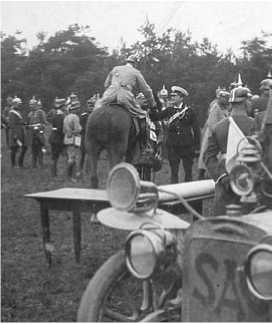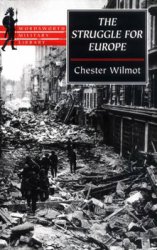
"I saw the Emperor today....This army is a terrible engine.”
WSC greets the Kaiser (mounted), German Army manoeuvres,
15 September 1909.
Churchill’s view of Germany was a combination of admiration, concern, reproach and magnanimity, and sometimes all four at once. He recognised the talents and gifts of the German race, but deplored their penchant for “blood-lust”, traits which he said “combine in the most deadly manner the qualities of the warrior and the slave”.
At the same time he admitted that “my hate had died with their surrender”, and in both World Wars Churchill was in the vanguard of those relative few arguing for lenient treatment of the defeated enemy.
In 1919 he wanted to send shiploads of food to the German ports Britain had tried to blockade in the late war. In 1945 he wrote sadly to his wife of the forty-mile-long columns fleeing before the Soviet advance, and he literally walked out of the conference at which
Stalin proposed shooting 50,000 Nazi officials. After the war, he was the first prominent statesman to argue for Franco-German rapprochement: “There can be no revival of Europe without a spiritually great France and a spiritually great Germany.” This would win him the trust and friendship of men such as Adenauer, who hoped to build the new Federal Republic on the ashes of a totalitarian past.
As a personal matter Churchill preferred visiting France to visiting Germany, which he only saw in detail as an author exploring Marlborough’s battlefields. He spoke French but not German, and had many more French than German friends. Nevertheless, magnanimity was always part of his German formulae.
Related quotations are in Chapters 20 and 23; in the former, see entries for Adenauer, Berchtold, Bismarck, Hanfstaengl, Hess, Himmler, Hindenberg, Hitler, Kaiser Wilhelm II, Ribbentrop, Rommel and Spee.




 World History
World History









